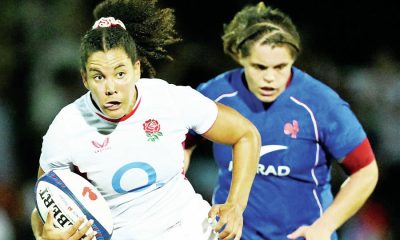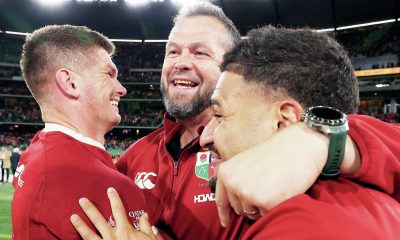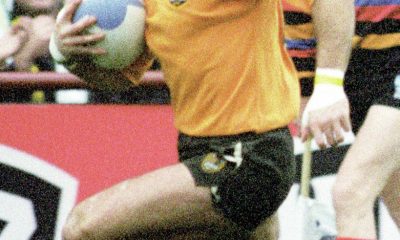 It’s hard to believe that ten years have passed since that great night in Sydney when an England team finally delivered on their potential with a nail-biting victory in the dying seconds of the game. Those of us lucky enough to be in the
It’s hard to believe that ten years have passed since that great night in Sydney when an England team finally delivered on their potential with a nail-biting victory in the dying seconds of the game. Those of us lucky enough to be in the
stadium that night will always remember the frustration and dread that England were going to somehow blow it again as penalty after penalty kept Australia in the game.
There were a few near misses during the long journey to that World Cup final, including a woeful quarter-final game against Wales, which was rescued from disaster by Mike Catt, also the appalling mix-up that saw England field 16 players against Samoa coinciding with a last-gasp try-saving tackle that may have won the game for the Samoans had they scored.
Fortunately for England, Clive Woodward had, in his meticulous planning, included a barrister who was able to convince the disciplinary panel that a fine of £10,000 rather than a point’s deduction would suffice.
As a result, England went into the knock-out stage not having to face another SANZAR team until the final, which made them outright favourites to win the Cup.
In the quarter-finals New Zealand disposed of South Africa while England beat Wales and then, in a controversial semi-final between Australia and New Zealand, there was a ten-minute break for a career-ending injury to Australian prop Ben Darwin, before Australia dumped New Zealand out 22-10 while England beat France 24-7.
As the team ranked No.1 in the world, England knew the Cup was theirs for the taking but it still needed a momentous effort to win.
All of us who had come so close in 1991 were both ecstatic that England had won and a little envious of Jason Leonard (who had played such a vital role in stopping the penalties at the scrum that eventually enabled England to win), because he was the only one that had survived long enough in the team to put right the mistakes we made in 1991.
The 2003 team was probably the most balanced England side to ever take the field with the backs that were considered by the opposition as much as a threat as the pack, a situation that had rarely been the case before.
England teams have always had one or two great backs but not a complete back line and usually relied on a dominant pack to win games. But Martin Johnson’s side were considered to have more of a threat in the backs than their forwards.
The 2003 pack were capable of winning at least 50 per cent of the ball and the backs were able to exploit that per centage to win games, unlike in 1991 where the England pack won 75 per cent of the ball but the team still lost.
The balance between forwards’ power and backs’ skills is the balance that Lancaster is striving to achieve and although there have been some great strides in getting that balance, it’s not there yet.
Despite the fact that there are just two years to go before the next World Cup, combinations are still being tried for the first time in this autumn series, so there will be disappointments for individual players and the team until Lancaster settles on his side.
Just as England under Woodward disappointed on the road to 2003 when the team, although winning games, failed to clinch those crucial victories and secure Grand Slams etc, even though they had been together for virtually six years.
That squad settled once Martin Johnson was given the captaincy permanently. This gave the squad that extra something in that one glorious year when they were able to secure a Grand Slam and the World Cup.
Lancaster and his team of coaches have much less time to ‘firm up’ their selections and give the team the stability, confidence and understanding in each others’ game that is needed to win a World Cup and take the team to another level.
I was surprised by the fuss that surrounded former Lions coach Warren Gatland‘s comments, that the Lions should in future have what, in effect, would be a quota system when it comes to future tours.
The stick he took, despite delivering a series win (with a little help from French referee Romain Poite), was not for picking ten Welshmen to start the final match, but for the omission of one Irishman, Brian O’Driscoll, and it seems to have troubled him.
Much as he believes he made the right choice, he has raised the question of whether there should be quotas, so as to save any future coach from the wrath of angry fans and media. My surprise is: Would anyone think that there was not already a sort of quota system that ensured that all four countries that make up the Lions, have some representation?
As far back as you care to go there have always been ‘trade-offs,’ so that each country would have at least a few players in the squad but the coach has always been able to select his ‘first team’ from the best players, no matter which country.
There have been a few complaints about the structure of the team, not least in 2005 when the call was that Woodward picked too many English, but those complaints usually surface only when the team loses.
Gatland won, so maybe he has a point, perhaps the Lions board should be more honest about selection and then, maybe, the fans will understand the politics that are involved.

1 Comment
You must be logged in to post a comment Login
Leave a Reply
Cancel reply
Leave a Reply
You must be logged in to post a comment.































jeff
14 November 2013 at 7:02 AM
Have to agree regards a quota system that appears to have been in evidence for quite some time Jeff. Peter Wright could be described as a beneficiary of this style of selection, possibly the most unskilled lion to have pulled on the sweater disgraceful appointment